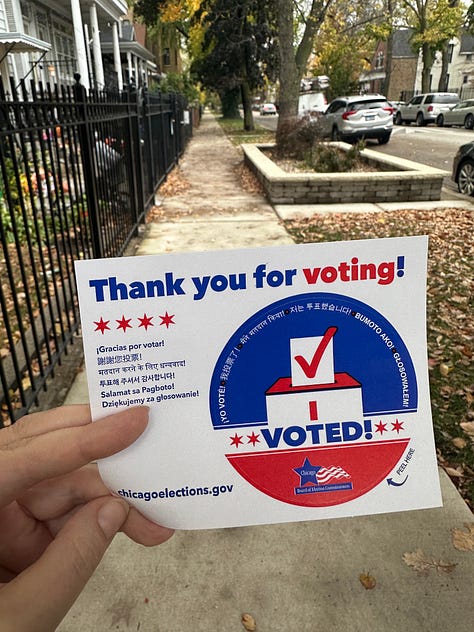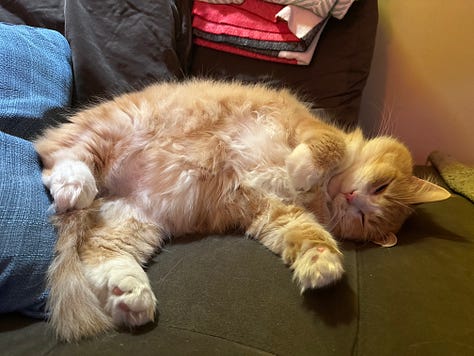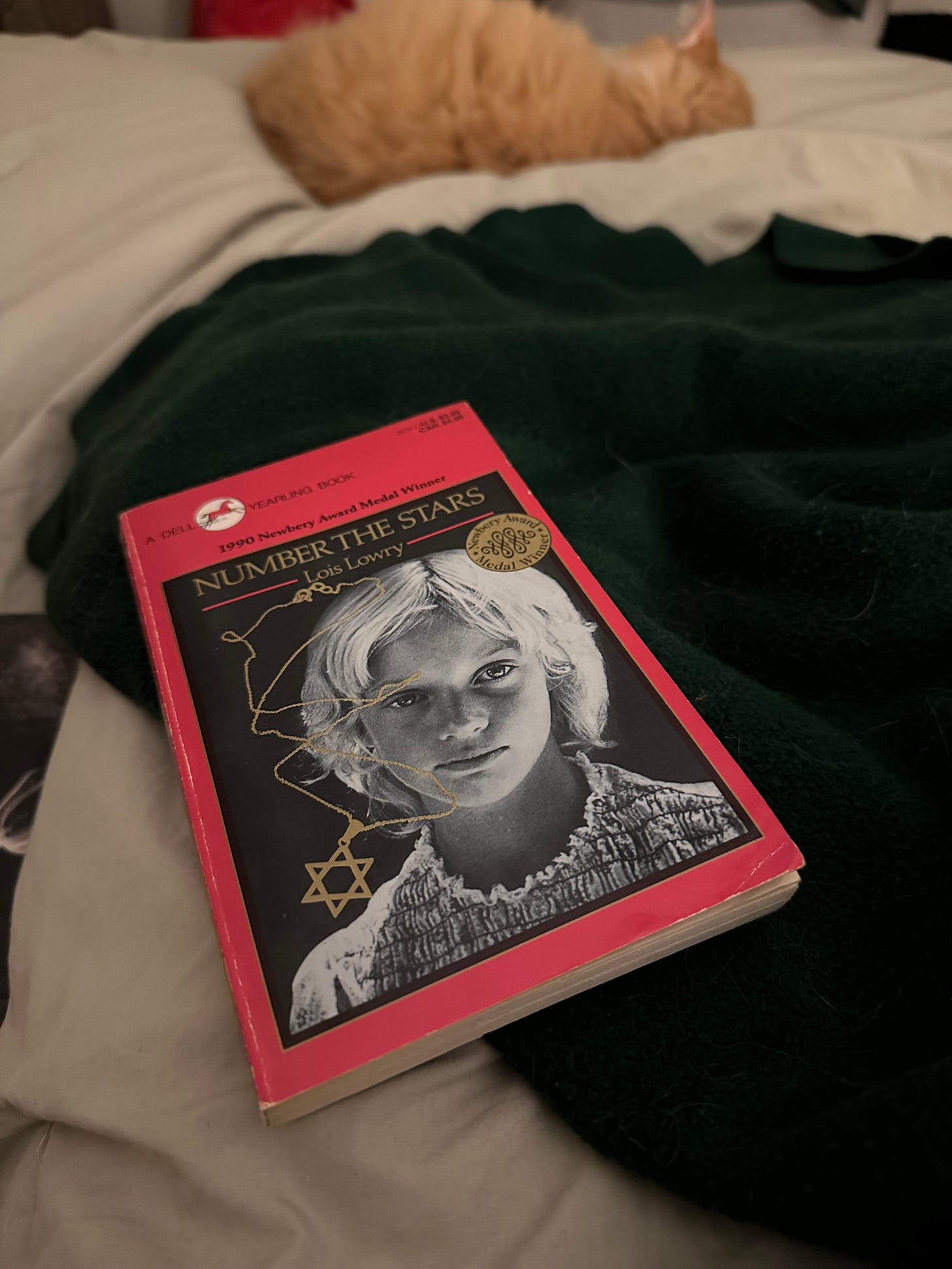With the Light of a Billion Brilliant Stars
in which it’s dark as hell right now, but I’m looking for the light, I swear I am
“The words were unfamiliar to her, and she tried to listen, she tried to understand, tried to forget the war and the Nazis, tried not to cry, tried to be brave. The night breeze moved the dark curtains at the open windows. Outside, she knew, the sky was speckled with stars. How could anyone number them one by one, as the psalm said? There were too many. The sky was too big.
Ellen had said that her mother was frightened of the ocean, that it was too cold and too big.
The sky was, too, thought Annemarie. The whole world was: too cold, too big. And too cruel.”
— Lois Lowry, Number the Stars
Whenever I visit my father’s house, my childhood home, I spend some time with the bookshelves. Sometimes I am on a mission, usually known only to me, for a specific book — most recently, I wanted to see if my mother had a copy of The Awakening — and other times, it is merely a comfortable habit. I look at the books, most of which were originally my mother’s. I pull books off the shelf. I put books back on the shelf. I look for books that Grandma might want to read. I look at the books with my dad. Sometimes he takes one to read; sometimes I take one.
I didn’t find The Awakening, which continues to puzzle me — surely, Mom would have read that? — but I did find an old beloved paperback of mine, Number the Stars.
If you aren’t familiar with the 1990 Newberry Award Medal Winner, it’s a story about two best friends and neighbors, Annemarie and Ellen, who live in Nazi-occupied Copenhagen in 1943. It’s a story about learning how to be brave in the darkest of times. It’s a story about standing up for what’s right, for looking out for your neighbor. It’s a story about hope.
Oh, how I loved this book as a child! I have a special, specific memory of reading it in my twin bed, my heart pounding as 10-year-old Annemarie realized her mother and Uncle Henrik were on a dangerous mission to sneak Ellen and her family, the Rosens, to safety in Sweden — and that she must play an indispensable role after her mother falls and breaks her ankle.
Annemarie makes her way through the dark woods to bring a mysterious packet to her uncle, not knowing what it was, only knowing that it was critical to save Ellen and her family from the Nazis. She is stopped by Nazi soldiers, yet manages to outwit them, in spite of their taunts (“Stop crying, you idiot girl”) and their laughter.
She’s 10! Ten years old! She does it: she delivers the mysterious packet in time to Uncle Henrik on his fishing boat, where the Rosens are hiding. The packet included a handkerchief that was permeated with a powder that attracted the Nazi police dogs and destroyed their sense of smell, so they did not discover the Rosens in hiding.
Thanks in huge part to her bravery and her successful mission, The Rosens make it to safety, and like her Uncle Henrik promised her, “Someday the war will end. All wars do.”
As I re-read this book again, I was not a child anymore, picturing myself in Annemarie’s shoes; instead, I hoped more to be as kind and brave as the adults in this story — which, by the way, is based on the real story of Annelise Platt and the history of Denmark’s Resistance leaders. Although Annemarie has not been reunited with Ellen by the end, there is real hope:
“The war would end. Uncle Henrik had said that, and it was true. The war ended almost two long years later. Annemarie was twelve.
Churchbells rang all over Copenhagen, early that May evening. The Danish flag was raised everywhere. People stood in the streets and wept as they sang the national anthem of Denmark.
Annemarie stood on the balcony of the apartment with her parents and sister, and watched. Up and down the street, and across on the other side, she could see flags and banners in almost every window. She knew that many of those apartments were empty. For nearly two years, now, neighbors had tended the plants and dusted the furniture and polished the candlesticks for the Jews who had fled. Her mother had done so for the Rosens.
‘It is what friends do,’ Mama had said.
Now neighbors had entered each unoccupied, waiting apartment, opened a window, and hung a symbol of freedom there.”
This morning I woke early to the devastating news that Donald Trump had been re-elected. My cat Peaches curled closely next to me as I held my phone in the dark. Eventually, I pulled myself out of bed and started my day, feeling much like I did on this day in 2016, but heavier, darker, worse. I got through my day as so many of us did, at times in a rage, others despondent, others numb.
I didn’t cry, not until I watched Kamala Harris walk on stage to give her concession speech. She was smiling, her head held high, shoulders back.
I was reminded again of Number the Stars:
“Annemarie realized, though she had not really been told, that Uncle Henrik was going to take them, in his boat, to Sweden. She knew how frightened Mrs. Rosen was of the sea: its width, its depth, its cold. She knew how frightened Ellen was of the soldiers, with their guns and boots, who were certainly looking for them. And she knew how frightened they all must be of the future.
But their shoulders were as straight as they had been in the past: in the classroom, on the stage, at the Sabbath table. So there were other sources too, of pride, and they had not left everything behind.”
I hope that if you have not already watched or read or listened to her speech, that you will do so. As for me, I am heeding her closing reminder seriously, that
“...only when it is dark enough can you see the stars. I know many people feel like we are entering a dark time, but for the benefit of us all, I hope that is not the case. But here’s the thing, America, if it is, let us fill the sky with the light of a billion brilliant stars, the light of optimism, of faith, of truth and service.”
The world feels too big and too cruel right now, but I do still believe that like Annemarie we will eventually see: “There were stars here and there, dotting the sky.”
Until then, take care of yourself. I’ll try to do the same. Books help. So do cats.








Thanks Alison. I have read that book so many times with students. You shaped a good perspective here in this devastating time.
Ugh. So beautiful. Thank you.